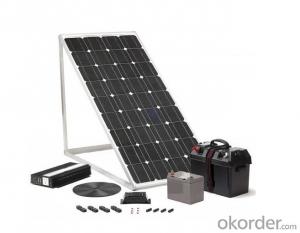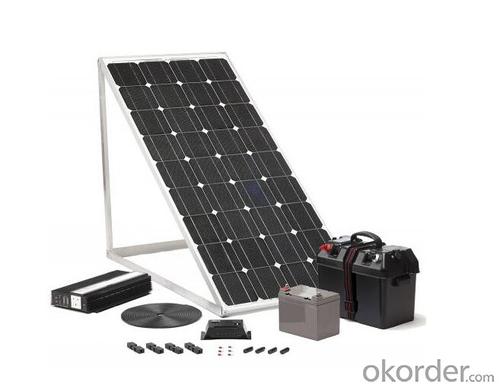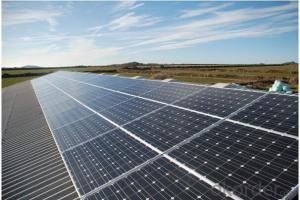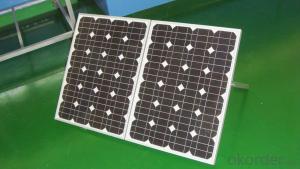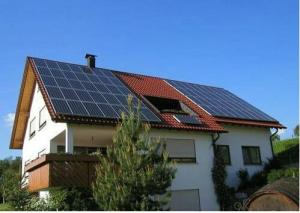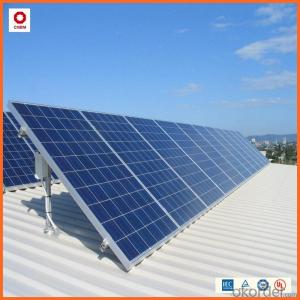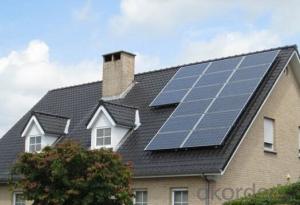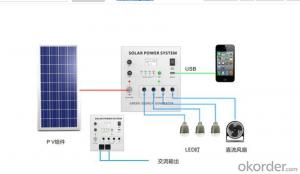Enphase Solar Energy Systems - Solar System 15W Made in China
- Loading Port:
- China Main Port
- Payment Terms:
- TT OR LC
- Min Order Qty:
- -
- Supply Capability:
- -
OKorder Service Pledge
Quality Product, Order Online Tracking, Timely Delivery
OKorder Financial Service
Credit Rating, Credit Services, Credit Purchasing
You Might Also Like
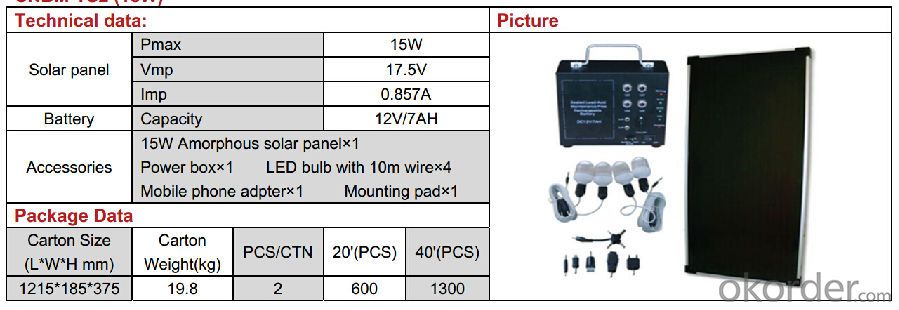
- Q: Can solar energy systems be used in disaster relief efforts?
- Yes, solar energy systems can definitely be used in disaster relief efforts. These systems are portable, easy to set up, and can provide a reliable source of electricity in areas where the traditional power grid might be damaged or inaccessible. Solar energy systems can power medical equipment, communication devices, lighting, and other essential needs, thereby aiding relief operations and helping affected communities recover faster. Moreover, solar energy systems have the added advantage of being renewable and environmentally friendly, reducing reliance on fossil fuels during already challenging times.
- Q: Can solar energy systems be used for industrial applications?
- Yes, solar energy systems can be used for industrial applications. Solar power can be harnessed to generate electricity and provide heat for a wide range of industrial activities such as manufacturing, heating, cooling, and powering machinery. By utilizing solar energy, industries can reduce their dependence on traditional fossil fuels, lower operational costs, and contribute to a more sustainable and environmentally friendly future.
- Q: How do solar energy systems impact renewable energy targets?
- Solar energy systems have a significant impact on renewable energy targets as they contribute to increasing the overall share of renewable energy in the energy mix. By harnessing the power of the sun, solar systems generate clean electricity, reducing the reliance on fossil fuels. This helps countries and communities to meet their renewable energy targets by diversifying their energy sources and reducing greenhouse gas emissions. Additionally, the scalability and accessibility of solar technology make it a viable option for both large-scale projects and individual homeowners, further accelerating the progress towards renewable energy targets.
- Q: How much money can I save with solar energy?
- The amount of money you can save with solar energy depends on various factors such as the size of your solar system, your energy consumption, and the cost of electricity in your area. On average, homeowners can save thousands of dollars over the lifetime of their solar panels. However, it is recommended to consult with a solar installer to assess your specific situation and calculate potential savings.
- Q: What are the disadvantages of using solar energy?
- One of the main disadvantages of using solar energy is its intermittent nature. Solar power can only be generated during daylight hours and is greatly affected by weather conditions, such as cloudy days or long periods of darkness. This means that solar energy may not be available consistently, which can be a downside for those who rely solely on solar power. Additionally, the initial installation cost of solar panels and equipment can be quite expensive, although the long-term savings on energy bills can offset this. Lastly, solar energy production requires a large amount of space, making it challenging to implement in densely populated areas or areas with limited available land.
- Q: Can solar energy systems be used in remote areas without access to the grid?
- Yes, solar energy systems can be used in remote areas without access to the grid. Solar panels can generate electricity by harnessing sunlight, which can then be stored in batteries for use when the sun is not available. This makes solar energy systems a reliable and sustainable solution for powering remote areas that are off the grid.
- Q: Can solar energy systems be used for heating and cooling homes?
- Yes, solar energy systems can be used for heating and cooling homes. Solar thermal systems can capture the sun's heat and use it to provide hot water or space heating. Additionally, solar-powered air conditioning systems can use solar energy to cool homes by absorbing heat from the indoor air and dissipating it outside.
- Q: Can solar energy systems be used in areas with limited access to healthcare?
- Yes, solar energy systems can definitely be used in areas with limited access to healthcare. In fact, solar energy systems can play a crucial role in improving healthcare services in such areas. Solar energy systems can be used to power medical facilities, including hospitals, clinics, and health centers, ensuring a reliable and uninterrupted supply of electricity. This is particularly important in remote or off-grid locations where access to the power grid is limited or non-existent. By providing a sustainable and independent source of energy, solar systems can help overcome the challenges associated with unreliable or insufficient power supply, which often hinder the provision of healthcare services. Solar energy can be used to power medical equipment, such as diagnostic tools, laboratory machines, and refrigeration units for storing vaccines and medications. This enables healthcare providers to offer essential services, such as diagnostics, treatment, and emergency care, even in areas where conventional power sources are scarce. Solar-powered medical equipment can also be mobile and easily transported, allowing healthcare workers to reach remote areas and provide primary healthcare services to underserved populations. Furthermore, solar energy systems can be utilized to provide lighting in healthcare facilities, particularly in areas where electricity is limited or not available at night. Adequate lighting is crucial for performing medical procedures, conducting surgeries, and delivering babies safely. Solar-powered lighting systems can also contribute to the overall well-being of healthcare workers, allowing them to work in well-lit and comfortable environments. Moreover, solar energy systems can power communication devices, such as phones and radios, enabling healthcare workers to connect with experts and access medical information, even in areas with limited connectivity. This can facilitate telemedicine initiatives, where remote consultations and diagnosis can be conducted by healthcare professionals from afar, further enhancing healthcare access in areas with limited access to healthcare infrastructure. Overall, solar energy systems offer a sustainable and reliable solution for powering healthcare facilities and improving healthcare services in areas with limited access to healthcare. By providing electricity to medical equipment, lighting, and communication devices, solar systems can contribute to better healthcare outcomes, increased efficiency, and improved access to vital medical services in underserved communities.
- Q: Can solar energy systems be used for powering research laboratories?
- Yes, solar energy systems can be used for powering research laboratories. Solar panels can generate electricity from sunlight, providing a renewable and sustainable energy source for laboratory equipment and operations. Additionally, advancements in solar technology have made it more efficient and cost-effective, making it a viable option for powering research facilities.
- Q: Can solar energy systems be used for powering medical facilities or clinics?
- Yes, solar energy systems can be used for powering medical facilities or clinics. Solar energy is a renewable and sustainable source of power that can be harnessed through solar panels. These panels convert sunlight into electricity, which can then be used to power various electrical appliances and equipment in medical facilities. Using solar energy systems for medical facilities has several advantages. Firstly, it reduces reliance on traditional grid electricity, which can be unreliable or unavailable in certain areas. Solar energy systems provide a consistent and independent source of power, ensuring that medical facilities can operate smoothly even during power outages or in remote locations. Secondly, solar energy systems are environmentally friendly. Medical facilities contribute to a significant amount of greenhouse gas emissions, mainly through the use of fossil fuels for electricity generation. By utilizing solar energy, medical facilities can significantly reduce their carbon footprint and contribute to a cleaner and healthier environment. Moreover, solar energy systems can help reduce operational costs for medical facilities. While the initial installation cost of solar panels may be higher, they have a long lifespan and require minimal maintenance. Over time, the electricity generated by solar panels can offset or even eliminate the need for purchasing electricity from the grid, resulting in substantial cost savings. In addition, solar energy systems can be combined with energy storage solutions, such as batteries, to ensure a continuous and reliable power supply. This is particularly crucial for medical facilities that require uninterrupted power for critical equipment and life-saving procedures. Overall, solar energy systems offer a viable and sustainable solution for powering medical facilities or clinics. They provide a consistent and independent source of electricity, contribute to a cleaner environment, and can help reduce operational costs. By harnessing solar energy, medical facilities can enhance their resilience, sustainability, and ability to provide quality healthcare services.
Send your message to us
Enphase Solar Energy Systems - Solar System 15W Made in China
- Loading Port:
- China Main Port
- Payment Terms:
- TT OR LC
- Min Order Qty:
- -
- Supply Capability:
- -
OKorder Service Pledge
Quality Product, Order Online Tracking, Timely Delivery
OKorder Financial Service
Credit Rating, Credit Services, Credit Purchasing
Similar products
Hot products
Hot Searches
Related keywords
